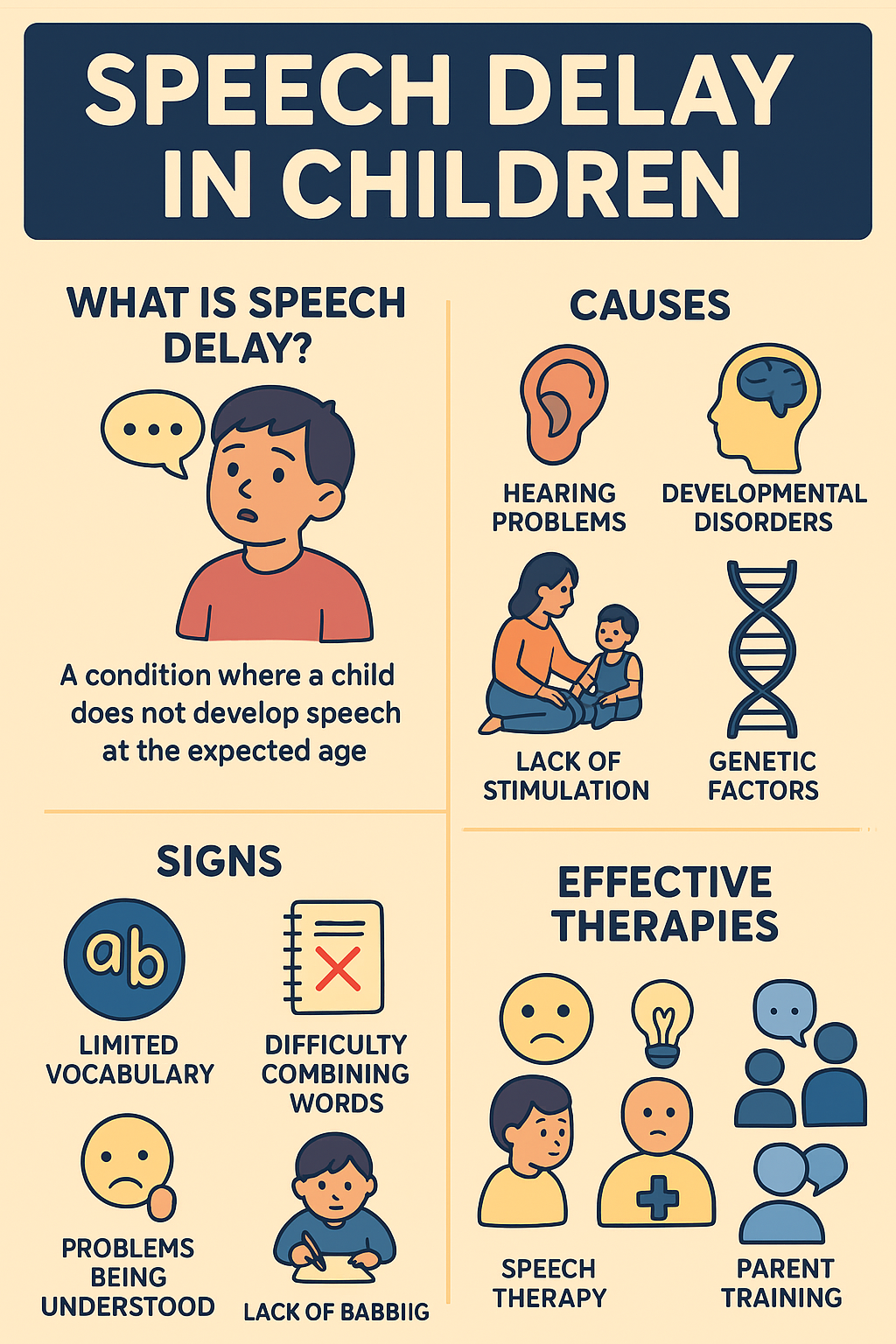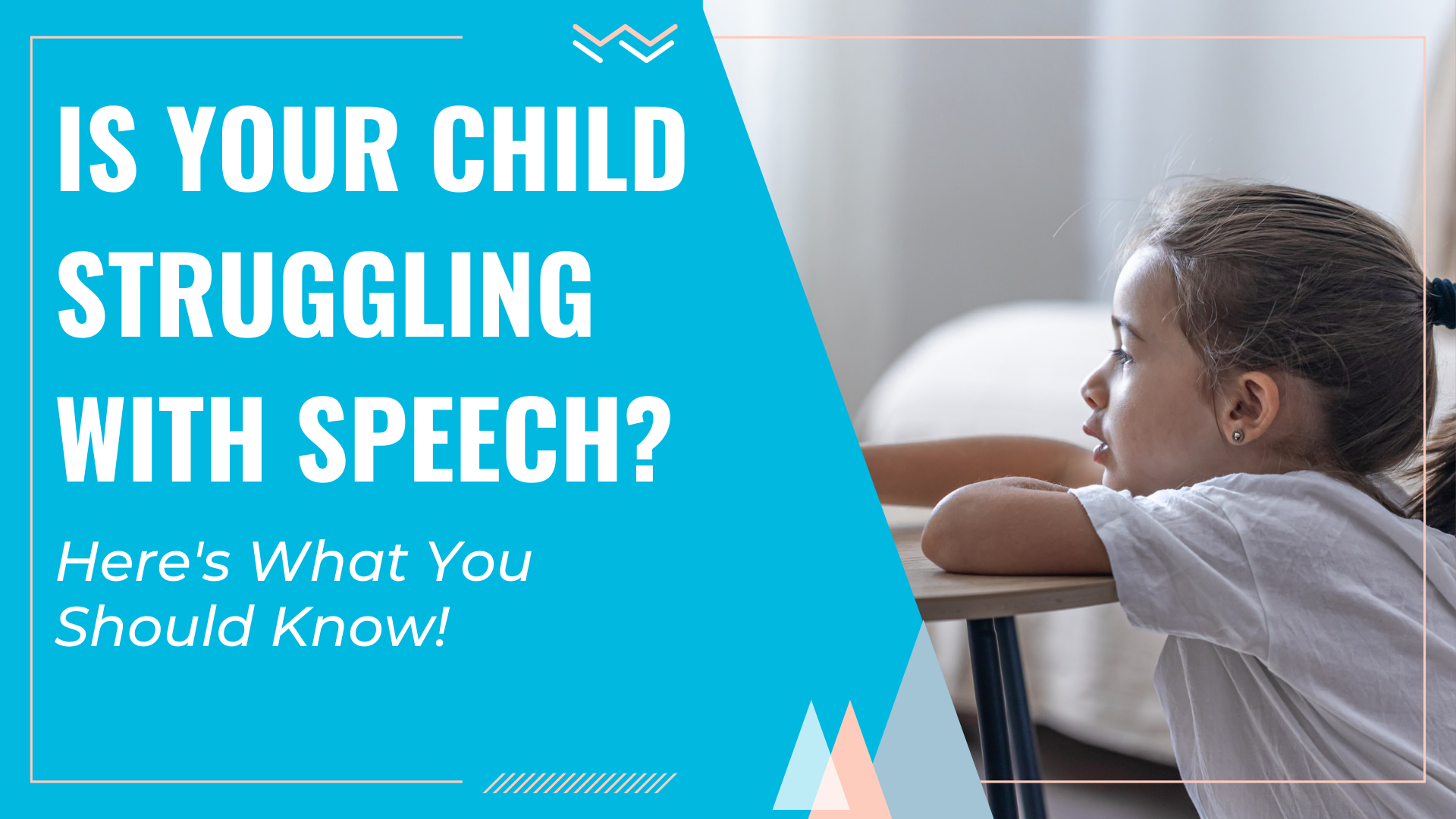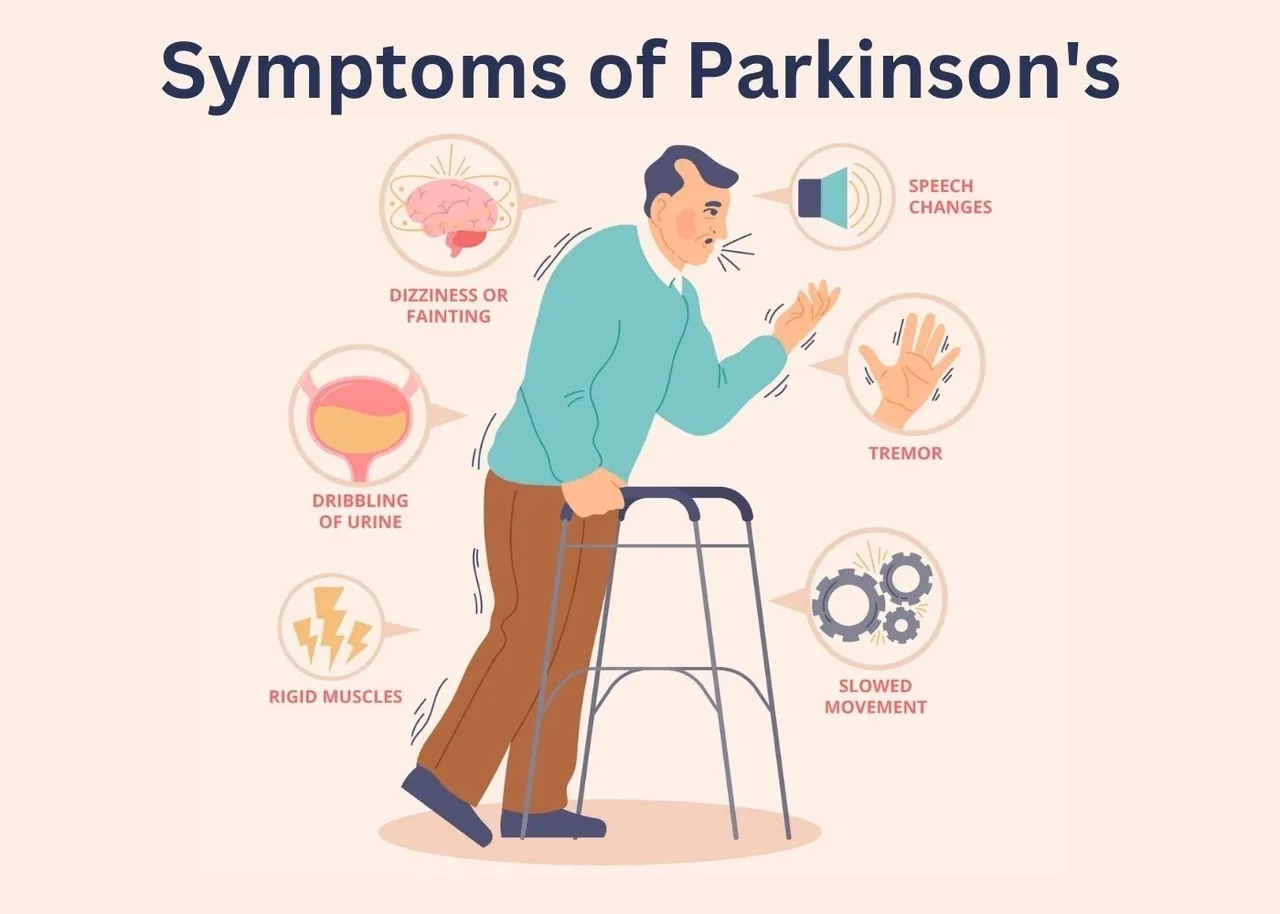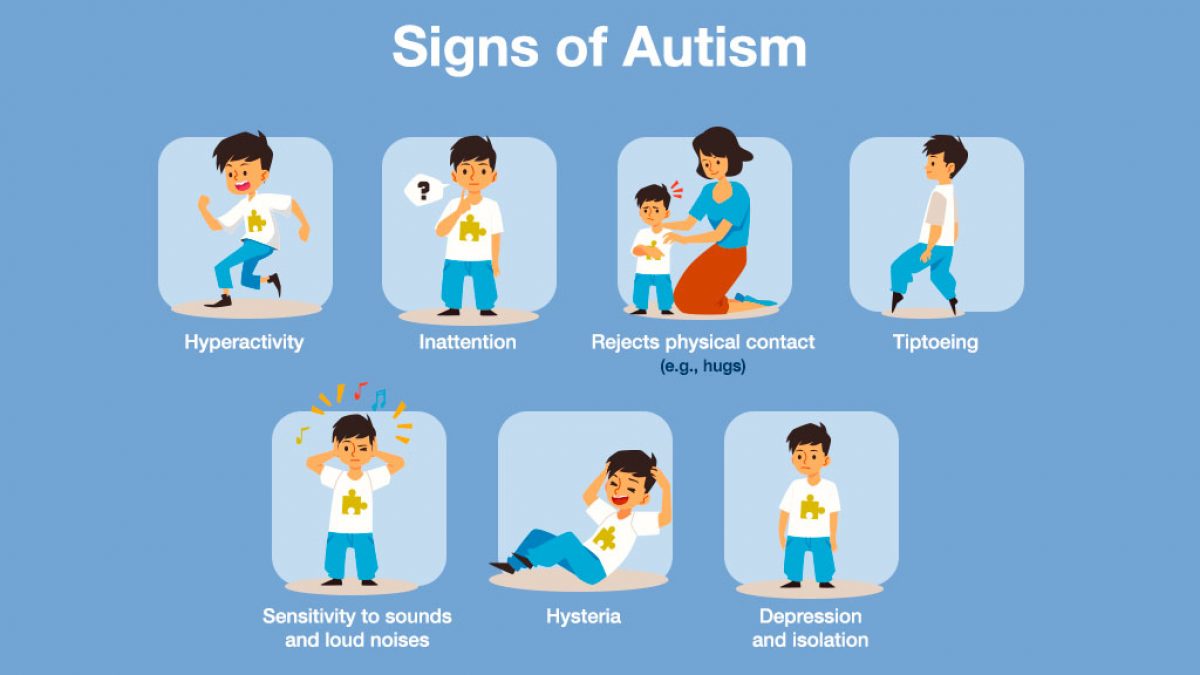Introduction to Speech Delay in Children
Speech delay in children can be a source of worry for many parents, especially when milestones don’t seem to line up with those of their peers. Some kids are quick to start speaking, while others take longer, leaving families wondering what might be happening.
These differences often raise questions about development, possible underlying factors, and when it may be the right time to seek help. By exploring the signs, potential causes, and available support, parents and caregivers can better understand how to encourage strong communication skills in their kids.
What is speech delay in children?
Speech delay in children refers to a condition where a child does not develop speech and language skills at the expected age. It is characterized by slower progress in learning to speak, form words, or use language to communicate effectively compared to typical developmental milestones.
While some children may simply develop language skills later than their peers, speech delay can sometimes indicate underlying issues such as hearing problems, developmental disorders, or neurological conditions. Early recognition and intervention are crucial to help children catch up and develop strong communication skills.
Speech Delay in Children vs. Alalia
While both involve difficulties with speech, they are not the same. Speech delay in children is a broader term that refers to children who develop speech and language skills later than expected but may still eventually catch up with their peers, especially with support or therapy. It can result from various factors, including hearing issues, lack of exposure, or mild developmental delays.
Alalia, on the other hand, is a more specific and severe condition. It refers to a congenital or early-acquired inability to speak due to neurological or brain-related causes, despite normal intelligence and hearing. Children with alalia may have extremely limited or absent speech and typically require specialized therapy to develop language skills.
Key difference: Speech delay can be temporary and often improves with intervention, whereas alalia is a neurological disorder that requires targeted treatment and is usually more persistent. Here is a summery of what you need to know about both conditions::
| Feature | Speech Delay in Children | Alalia |
|---|---|---|
| Definition | Slower development of speech and language skills compared to typical age milestones. | Congenital or early-acquired inability to speak due to neurological causes, despite normal intelligence and hearing. |
| Onset | Often noticed between 18 months and 3 years, sometimes later. | Present from birth or develops in early childhood. |
| Causes | Hearing problems, limited language exposure, mild developmental delays, or environmental factors. | Brain or neurological disorders affecting speech centers; not caused by hearing or cognitive deficits. |
| Prognosis | Many children catch up with peers, especially with early intervention and therapy. | Persistent condition; requires specialized therapy and long-term support. |
| Intervention | Speech therapy, parent-led language activities, hearing assessments. | Intensive, specialized speech and language therapy; sometimes multidisciplinary support. |
Normal Speech Development Milestones
Children typically reach certain speech and language milestones as they grow, although individual timelines can vary.
-
- By around 6 months, babies usually begin babbling and experimenting with sounds.
- By 12 months, many can say their first meaningful words.
- Between 18 and 24 months, toddlers often combine two words, like “more milk,” and their vocabulary rapidly expands.
- By 3 years, children can form simple sentences and be understood by familiar adults.
- By 4–5 years, most can speak clearly, use complex sentences, and engage in conversations with peers.
Awareness of these milestones helps parents and caregivers recognize potential speech delays early and seek professional help before its too late for their children to cope up with their peers.

Signs of Speech Delay in Children
To help you in recognizing if your child is experiencing speech delay we will quickly go through some of the common signs to watch for:
-
Limited Vocabulary – A child may have far fewer words than peers of the same age. For example, by age 2, most children use at least 50 words, but a child with speech delay may use far less.
-
Difficulty Combining Words – By 18–24 months, children typically start forming two-word phrases (“some juice”). Struggling to combine words may signal a delay.
-
Problems Being Understood – If familiar adults often struggle to understand the child’s speech, this may indicate a delay.
-
Minimal Babbling in Infancy – Babies who rarely babble or make sounds by 6–9 months could show early signs of speech delay.
-
Limited Imitation of Sounds or Words – Children often learn speech by imitating adults; lack of imitation may suggest a problem.
-
Frustration During Communication – Difficulty expressing needs can lead to frequent frustration, tantrums, or reliance on gestures instead of words.
-
Delayed Use of Gestures – Limited pointing, waving, or other non-verbal communication can sometimes accompany speech delay.
Early intervention, such as speech therapy or language-enriching activities at home, are essential to help children overcome these challenges and build strong communication skills.
What Causes of Speech Delay in Children
Speech delay in children can result from a variety of factors, ranging from temporary issues to underlying medical conditions. Understanding the exact cause for your little one helps parents and caregivers seek timely and personalized support. Common causes of speech delay include:
-
Hearing Problems – Difficulty hearing can prevent children from learning words and sounds properly. Ear infections, fluid in the ears, or congenital hearing loss are common contributors.
-
Developmental Disorders – Conditions such as autism spectrum disorder (ASD) or global developmental delays are among the common causes of speech delay and can affect speech and language development.
-
Neurological or Brain Disorders – Disorders affecting the brain or nervous system, like cerebral palsy or alalia, may hinder speech development.
-
Environmental Factors – Limited exposure to language, minimal interaction with adults, or lack of stimulating communication at home can slow speech acquisition.
-
Genetic or Familial Factors – Speech delays sometimes run in families, suggesting a hereditary component.
-
Oral-Motor Problems – Difficulties with the muscles used for speech, including the tongue or lips, can make forming sounds challenging.
-
Selective Mutism or Emotional Factors – In some cases, anxiety or social factors may temporarily delay speech, even when physical and cognitive development is normal.
Diagnosis and Evaluation of Speech Delay in Children
Identifying speech delay in children involves a thorough evaluation by qualified professionals. Early diagnosis is crucial to provide timely support and maximize a child’s communication potential. Key steps in the process include:
-
Medical and Developmental History – The pediatrician or speech-language therapist gathers information about the child’s birth, health, hearing, family history, and overall development.
-
Hearing Assessment – Since hearing problems are a common cause of speech delay, audiologists often conduct hearing tests to rule out hearing loss or chronic ear infections.
-
Speech and Language Evaluation – A speech-language pathologist assesses the child’s vocabulary, sentence structure, articulation, comprehension, and social communication skills. This may involve observing play, structured tasks, and parent questionnaires.
-
Neurological and Cognitive Assessment – In some cases, doctors may evaluate neurological function or cognitive development to identify underlying disorders such as cerebral palsy, autism spectrum disorder, or global developmental delays.
-
Observation of Communication Behavior – Professionals observe how the child expresses needs, responds to prompts, imitates sounds, and uses gestures to understand their overall communication abilities.
-
Standardized Testing – Age-appropriate standardized tests may be used to compare the child’s speech and language skills with typical developmental milestones.
Based on the evaluation, specialists can determine whether a child has a mild speech delay, a more significant disorder, or a condition like alalia. This diagnosis informs a personalized intervention plan, which may include speech therapy, hearing support, or targeted developmental programs.
Here is a summery table to understand how language delay is dragonized.
Here’s a concise, parent-friendly table summarizing the evaluation steps for speech delay in children:
| Evaluation Step | Purpose | Who Conducts It |
|---|---|---|
| Medical & Developmental History | Gather information about birth, health, family history, and overall development | Pediatrician / Speech-Language Therapist |
| Hearing Assessment | Rule out hearing loss or chronic ear infections | Audiologist |
| Speech & Language Evaluation | Assess vocabulary, sentence formation, articulation, comprehension, and social communication | Speech-Language Pathologist |
| Neurological & Cognitive Assessment | Identify underlying disorders affecting speech, such as autism or cerebral palsy | Pediatric Neurologist / Developmental Specialist |
| Observation of Communication Behavior | Understand how the child expresses needs, imitates sounds, and uses gestures | Speech-Language Therapist / Parent input |
| Standardized Testing | Compare the child’s speech and language skills to age-appropriate norms | Speech-Language Pathologist |
This table gives parents a quick, easy-to-understand overview of what to expect during the diagnosis and evaluation of speech delay in children.
How Speech Therapy Can Help Children with Speech Delay
Speech therapy plays a crucial role in supporting children with speech delay, helping them develop clear communication skills and confidence. Here’s how it works:
-
Improving Articulation and Pronunciation – Therapists guide children on how to produce sounds correctly, teaching tongue placement, lip movement, and breathing techniques to improve clarity.
-
Expanding Vocabulary and Language Skills – Through structured activities and play, children learn new words, sentence formation, and ways to express ideas effectively.
-
Enhancing Comprehension and Listening – A Speech therapist helps children understand instructions, follow conversations, and process language more efficiently.
-
Developing Social Communication – Therapists focus on skills like turn-taking, eye contact, and using language appropriately in social situations, fostering better interaction with peers and adults.
-
Parent and Caregiver Involvement – Speech therapists train parents on exercises and strategies to practice at home, ensuring consistent reinforcement and faster progress.
-
Addressing Underlying Issues – If the speech delay is related to hearing loss, neurological issues, or oral-motor difficulties, therapy may include specialized interventions tailored to the child’s needs.
Early and consistent speech therapy can significantly improve communication skills, boost confidence, and help your child catch up with their peers, making it an essential part of intervention for speech delay in children.
Myths and Misconceptions About Speech Delay in Children
Speech delay in children is often surrounded by misunderstandings, which can prevent timely intervention. Understanding these myths helps parents make informed decisions:
-
“The Child Will Just Grow Out of It” – While some children develop speech later than their peers, not all speech delays resolve on their own. Early intervention can prevent future learning and social difficulties.
-
“Boys Always Talk Later Than Girls” – Although boys may sometimes start speaking later, persistent delays should not be ignored and need evaluation regardless of gender.
-
“Talking Late Means Low Intelligence” – Speech delay does not necessarily indicate cognitive problems. Many children with normal intelligence experience temporary delays.
-
“Screen Time Doesn’t Affect Speech” – Excessive screen exposure can reduce opportunities for real-life communication, which is critical for language development.
-
“Parents Can’t Help” – On the contrary, parent involvement is key. Talking, reading, and interactive play can greatly support a child’s speech development.
-
“Speech Therapy Is Only for Severe Cases” – Therapy can benefit children with mild delays as well, helping them catch up more quickly and avoid frustration or social difficulties.
Understanding and debunking these misconceptions encourages parents to seek timely guidance and support, giving children with speech delay in children the best chance to living a full and confident life.
Practical Tips for Parents at Home
Parents play a vital role in helping children overcome speech delay. Simple daily activities and consistent interaction can significantly boost language development. Here are some practical tips for parents:
-
Talk Frequently with Your Child – Describe your actions, surroundings, and objects during daily routines. Narrating what you’re doing exposes your child to new words and sentence structures.
-
Read Together Daily – Picture books and simple stories encourage listening skills, vocabulary growth, and comprehension. Ask questions and encourage your child to point to or name objects.
-
Use Simple and Clear Language – Speak slowly, use short sentences, and emphasize key words to make it easier for your child to understand and imitate.
-
Encourage Imitation and Repetition – Repeat sounds, words, and phrases and gently encourage your child to mimic you. Positive reinforcement builds confidence.
-
Engage in Interactive Play – Games, songs, and pretend play stimulate language use and help children learn social communication naturally.
-
Limit Screen Time – Replace passive screen time with activities that involve talking, listening, and interacting to promote active language learning.
-
Be Patient and Positive – Celebrate small progress, avoid criticism, and maintain a supportive environment. Consistency and encouragement motivate children to practice more.
-
Seek Professional Guidance When Needed – If your child shows signs of significant speech delay, involve a speech-language therapist for targeted exercises and strategies.
By incorporating these strategies, parents can actively support their child’s speech development and complement professional therapy, helping children overcome speech delay in children and communicate more confidently.
Speech delay in children can be challenging for both kids and parents, but early recognition and intervention make a significant difference. With the right support, children can develop strong communication skills, build confidence, and thrive alongside their peers. If you notice signs of speech delay in your child, don’t wait—seeking professional guidance is key. Speech Therapy Uganda offers expert assessment and therapy tailored to your child’s needs. You can reach out via email at ask@speechtherapyuganda.top or call +256751525877 to get started on helping your child communicate effectively.



